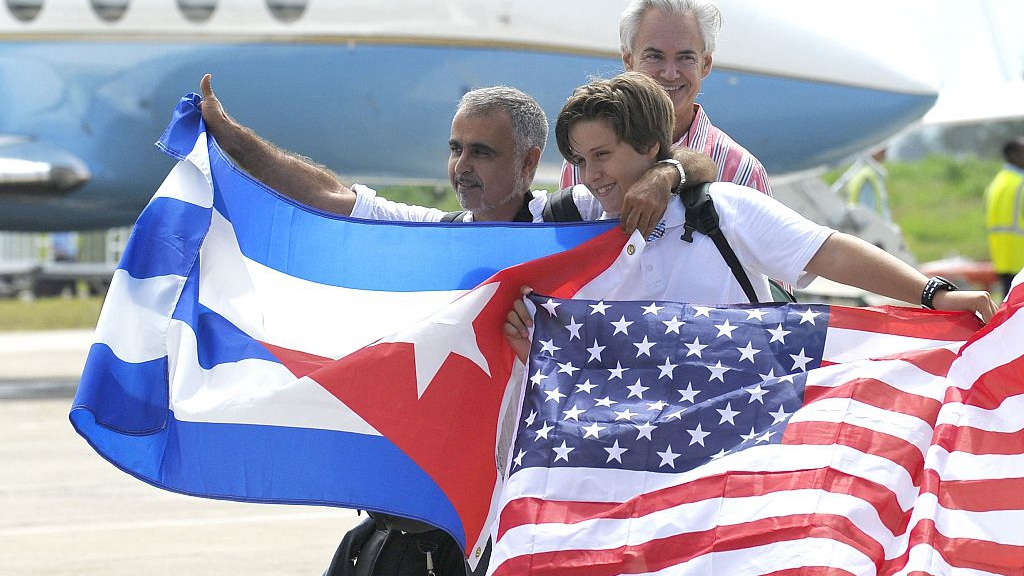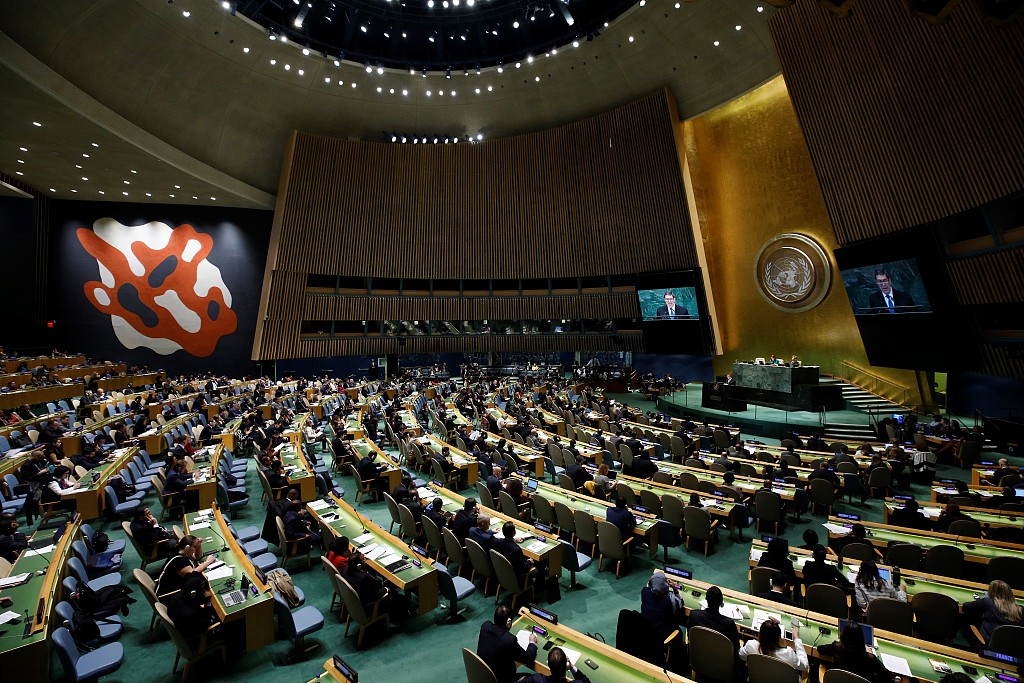
Opinion
14:19, 11-May-2019
The final fig leaf for Helms-Burton Act is gone
Pan Deng

Editor's note: Pan Deng is a member of the Academic Committee at the Charhar Institute and executive director of the Latin America and Caribbean Region Law Center of China University of Political Science and Law. The article reflects the author's opinion, and not necessarily the views of CGTN.
U.S. President Donald Trump has broken another record. Last month he decided to enforce a controversial provision of the 1996 Helms-Burton Act against Cuba. The section has been suspended by every president since Bill Clinton. Now the final fig leaf is gone.
Glossy justification and typical hypocrisy
In February 1996, the Cuban air force shot down two planes owned by the anti-Castro regime from the United States. U.S. Senator Jesse Helms and Representative Dan Burton immediately passed the Cuban Liberty and Democratic Solidarity Act, which was approved by Congress and signed into effect by then president of the United States Bill Clinton, citing "attacks on civilian personnel on board" and "worrying human rights situation."
The bill was given a glossy justification when it was deliberated. Its defenders believed that in the past countries faced with unexpected political and security incidents usually adopted political condemnation supplemented by diplomatic mediation. With this approach, if one side adopted a slightly inappropriate method, it could easily lead to all-round confrontation and even a war. This legislation pioneered the application of provisions under the economic framework in political events, thus steering conflicts to areas easier to control.

Cuban Foreign Minister Bruno Eduardo Rodriguez Parrilla speaks at United Nations General Assembly 30th plenary meeting on necessity of ending the economic, commercial and financial embargo imposed by the United States of America against Cuba at the UN headquarters in New York, November 01, 2018. /VCG Photo
Cuban Foreign Minister Bruno Eduardo Rodriguez Parrilla speaks at United Nations General Assembly 30th plenary meeting on necessity of ending the economic, commercial and financial embargo imposed by the United States of America against Cuba at the UN headquarters in New York, November 01, 2018. /VCG Photo
It's the most typical hypocrisy at play. Obviously, the U.S. intended to ramp up economic pressure on the rivals to achieve something that used to be possible only through exchange of political interests or hand-to-hand combat in the battlefield, so as to reduce the cost of sanctions, yet still boast of being a beacon of freedom, justice and democracy. Unfortunately, this time the lawmakers' practice was so clumsy that most people today have forgotten the formal name of the law and directly used the name of its initiator, the Helms-Burton Act, in criticizing it.
The United States accused Cuba of violating international law by shooting down American planes back then. However, the U.S. connivance of Cuban exile groups to carry out military provocations itself violates the more fundamental general principle of international law, namely "respect for sovereignty." The United States has imposed an economic embargo on Cuba since the 1960s, which is the most direct reason for the decline in the medical conditions and nutritional status of the Cuban people. According to Helms' logic, it seems that Cuba should have the right to retaliate on the grounds of human rights.
Reincarnation of 'extraterritoriality'
Besides, "human rights" have never been defined as a political tool for a country to achieve its own goals. According to the international conventions on human rights, only certain international organizations have the right to determine whether a government has violated human rights. Any country, including the United States, has no right to retaliate unilaterally on the ground that Cuba violates human rights.
The worries about the international order caused by this act are also reflected on the economic front. Now that a country's investment and trade have been extended abroad, the jurisdiction of its economic rules should also be extended overseas. Therefore, there is nothing wrong about the extraterritorial application of its economic law. But the Helms have gone too far this time.
This provision allows for U.S. companies and individuals to sue, in a U.S. court, any entities that "trafficked" in, or profited from the use of, confiscated U.S. property, regardless of the nationality of the defendant.
This kind of provision clearly marks a stretch of the authority of a country's judiciary. The law enables U.S. to put restrictions on any third country besides its adversary based on its own political will. In theory, it can restrict the freedom of economic activities of nationals and legal persons of every country in the world and directly damage the sovereignty of all other countries. Creating a national law to bind the entire international community smacks of reincarnation and upgrade of the "extraterritoriality" in the colonial era. It has long departed from the original intention of "retaliating against Cuba."
What is even more ironic is that the World Trade Organization (WTO) had just been established one year before the enactment of this bill. In order to protect world trade and investment activities, the WTO regards free trade as the most fundamental principle-which is exactly what Helms' motherland has been vigorously upholding and defending. The "principle of free trade" precisely requires that all obstacles, including laws, regulations, policies and measures, that hinder and prevent the development and conduct of international trade be restricted and removed.

The director of the North America Department of Cuba's Foreign Ministry, Cuban Josefina Vidal (2-R), and members of her delegation participate in the first day of closed-door talks between Cuba and the United State, at the Convention Palace in Havana, January 21, 2015. /VCG Photo
The director of the North America Department of Cuba's Foreign Ministry, Cuban Josefina Vidal (2-R), and members of her delegation participate in the first day of closed-door talks between Cuba and the United State, at the Convention Palace in Havana, January 21, 2015. /VCG Photo
History repeats itself
The Helms-Burton Act shocked all countries. The United States was the major trading partner of most American countries. The bill originally intended to force them to choose whether to give up doing business with Cuba or to retain the opportunity to do business in the United States.
However, to the surprise of the United States, many countries announced that they would take swift and serious retaliatory measures. The EU sued to the WTO over the case. It is really difficult for the United States to justify the law and it faced the risk of losing the lawsuit.
Clinton had to walk a tightrope between "maintaining hegemony" and "demonstrating morality" and decided to postpone the implementation of Chapter III of the bill for six months. Moreover, when every six-month period expired, successive presidents would postpone it for another six months. Mr. Trump did not decide to activate it until April this year. The world public opinion once again was in an uproar just like what happened before. Some countries again place their hopes on the WTO and try to use litigation to put a stop on it.
The discussion on the legitimacy of the Helms-Burton Act is not worthy of the time and energy of WTO justices, as Clinton and Obama, who were lawyers, would not shelf the act if they could find any justification.
The problem is that today's U.S. president does not need to be coy and indecisive in choosing between "maintaining hegemony" and "demonstrating morality" as his predecessors did.
(If you want to contribute and have specific expertise, please contact us at opinions@cgtn.com.)

SITEMAP
Copyright © 2018 CGTN. Beijing ICP prepared NO.16065310-3
Copyright © 2018 CGTN. Beijing ICP prepared NO.16065310-3